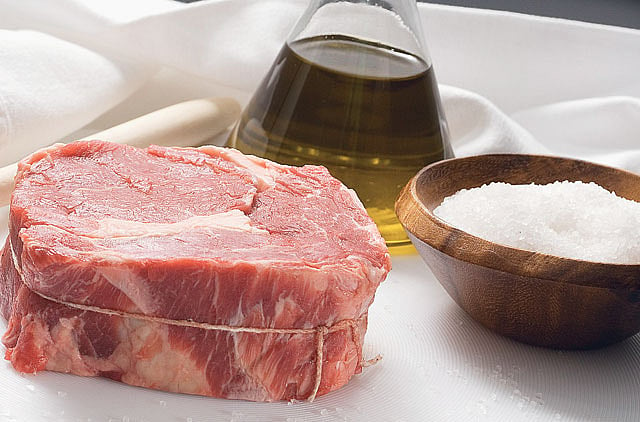What's the right time to add salt when cooking?
And how can you deal with oversalting?

Adept as they may be at the fine art of frying, the denizens of fish-and-chip shops are not renowned for their concern for their customers' health. So I was surprised to receive a caution recently from the man behind the counter in our local. "You ought to watch that," he said, indicating the shaker I had been agitating over my supper for the preceding 30 seconds. I thanked him for his concern and went home to continue the seasoning process in private.
Season without reason
I like salt. I'm quite free with the stuff in the kitchen. Dried beans and pulses are the only time I lay off: I can't remember when I first heard salt would make them tough but the idea is widespread.
I decide on a Mexican black bean recipe. The beans are soaked overnight in water, then rinsed and divided into two pans. One receives a teaspoon of ordinary cooking salt and both are covered with fresh water. They're cooked for a couple of hours until soft — I had anticipated a difference in cooking time but although there are a few stubbornly hard ones in each batch, these seem equally distributed and I put them down to the packet's rather advanced age rather than anything I've done. What's more interesting, is that the salted beans aren't discernibly so — both lots need a hefty dose of salt. I consult legendary scientific food writer Harold McGee on the subject.
Expert opinion
"Many cooks say adding salt to the cooking water prevents beans from softening," he says in On Food and Cooking. "It slows the rate at which they soften but they eventually absorb it and soften. And when beans are presoaked in salted water, they cook much faster."
According to McGee, adding plain salt to the soaking water "speeds cooking greatly, apparently because the sodium displaces magnesium from the cell-wall pectins and so makes them more easily dissolved." Adding baking soda, meanwhile, which contains sodium and an alkali, apparently reduces cooking time by 75 per cent.
Price of speed
As with so many things in life, speed comes at a price: "The alkalinity of baking soda can give a soapy-mouth feel. And salt reduces the swelling and gelation of starch granules within beans, which means it favours a mealy internal texture over a creamy one." I suspect the beans we get in most grocers' aren't in the first flush of youth, which makes them difficult to soften, salt or no salt.
Another salt-related issue has been bothering me, ever since I looked into the issue of searing steak. It seemed clear that, although salting the meat before cooking drew out water, it created a flavourful crust and the brief cooking time prevented too much moisture loss. But was I wrong to pre-salt stews and casseroles, given they were cooked for so much longer?
Osmosis matters
Hervé This, arguably France's most famous chemist, cites osmosis as the key to understanding the problem. In his Science of Cooking he explains: "If the dish, basically a piece of meat in water, is not salted at the start, the mineral salts pass into the solution in which the meat steeps. At the end of the cooking time, the meat is tasteless. On the other hand, if it is salted before cooking, the gravy will suffer because the meat's juices will remain within the meat." Therefore, if you want flavourful meat, salt it. If you want a delicious gravy, don't.
Stew on trial
I decide to see how serious the effect is on beef stew. I brown onions, diced carrot, celery and turnip in unsalted butter, divide the vegetables between two casseroles and brown half the stewing beef in heavily seasoned flour, and half of it in plain flour. I add the same stock to both and an extra pinch of salt to one for luck, and pop the two dishes into a medium oven.
A couple of hours later, I pull them out. The salted version has far less sauce but, contrary to This's predictions, it's richer and thicker than the unsalted stuff, which is fairly drowning in its own juices. The salted meat, once rested, is more flavourful but slightly drier. Its gravy is savoury and delicious. The unsalted casserole is less tempting: even adjusting the seasoning before serving doesn't help and I end up adding a lot more salt than I did to the other batch just to make it palatable.
According to This, I should add the salt "a little before the end, so the juices are harmoniously divided between the two components of the dish." Always read the footnotes, I remind myself.
Quick fix
I add an extra tablespoon of salt to my beef casserole and taste it. Rather than enhancing the other flavours, the salt is overpowering them. I have a remedy up my sleeve — a large, raw potato, cut into chunks to increase its surface area. In theory, this should absorb some of the salt. I take the meat out of the sauce and drop the spud in. Half an hour later, the sauce tastes better, but not much. I dilute the stew with more water and, worried that adding any more will make the stew tasteless, I bulk it out with pearl barley. The stew looks more like an amateurish risotto but it is at least edible.
Sign up for the Daily Briefing
Get the latest news and updates straight to your inbox
Network Links
GN StoreDownload our app
© Al Nisr Publishing LLC 2025. All rights reserved.